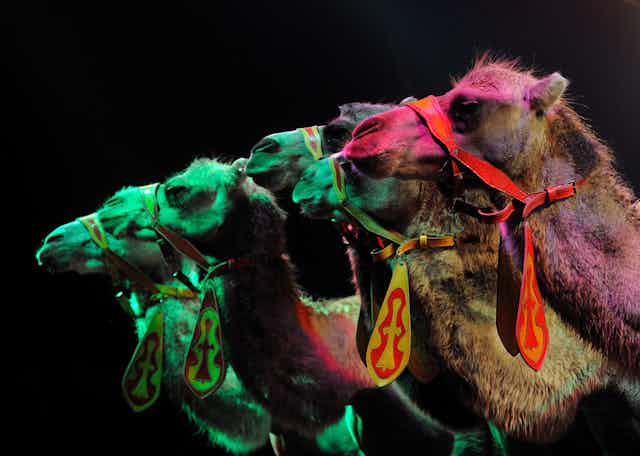The idea of animals as spectacle – in zoos, circuses, aquaria, tests of strength and even criminal proceedings – is an old one, dating back to at least ancient Greece and Rome.
Similarly, the use of animals for entertainment has a long history and, until recently, was a relatively accepted practice. This month, the media’s attention was caught by a group of camels that ran away from a circus in Melbourne. What were they running away from?
Better lives for nonhuman animals
Since the 1970s, there have been various attempts to secure better lives for nonhuman animals, and these have often focused on animals in captivity. More specifically, on animals kept in captivity for entertainment purposes.

One response to this has been to re-brand certain institutions, such as zoos, as educational and/or conservational. Whether this has achieved its aims or not is hard to ascertain. Why? Debate still rages about whether visiting zoos/ aquariums has a positive effect on attitudes to animals, as well as the ethics of keeping animals in such places.
The arguments against animals kept solely for entertainment seem to be clearer cut. More and more people indicate they do not accept practices such as the keeping of animals in circuses, zoos and aquaria.
The recent coverage of alleged animal suffering at Seaworld, with drops in attendance and high profile bands pulling out of appearances is a case in point – as are the runaway camels.
Who cares for animals?
The animal protection movement is often cited as a major factor in this change in attitudes toward animals in captivity and this is surely the case. Social media also plays a significant role as stories abound about animal capabilities as well as their mistreatment, as seen when stories about the “world’s saddest animal” go viral.

But attitudes to animals seem to be changing more broadly as we humans slowly take on board the idea that we are simply one part of an interconnected ecosystem.
Part of this comes from a recognition of the capabilities of other animals as we start to realise they aren’t so different to us – and that they too suffer in captivity and revel in freedom.
Part of it is also that we now understand that callous and cruel treatment of other animals deeply affects us as individuals and as members of society. As the philosopher Immanuel Kant pointed out in the 18th century:
He who is cruel to animals becomes hard also in his dealings with men. We can judge the heart of a man by his treatment of animals.
Special animals
As a society, we are less tolerant of certain animal abuses than previously – although this tends to be limited to concern over species we hold dear and rarely extended, say, to species farmed for food.
This is very much the case for animals in circuses, particularly elephants. Growing concern over animal wellbeing as well as increasing recognition of the physical and emotional needs of other animals has led to calls to ban animals in circuses and there seem be few grounds to counter these calls.

Arguments we hear about zoos – regarding the necessity of such institutions as places that allow families to connect to the natural world, say – hold little sway here. Animals in circuses are kept in anything but natural surroundings and forced to perform demeaning “tricks” for entertainment that bear little or no resemblance to their natural behaviour.
There are countless welfare considerations connected to the endless travelling and training these animals undergo. And there is perhaps a bigger consideration here: the lack of respect shown to these animals underlines the idea that animals are not as important as humans and are nothing more than a human resource.
Humans and non-humans
Are humans superior animals? Must we control nature to demonstrate our civility and humanity? This is a disturbing and harmful belief system. It is one that contributes to interpersonal and societal violence – as we now know from the vast body of research into the human-animal violence link.
Teaching ourselves and our children that animals do not matter has far-reaching consequences. Research demonstrates that such attitudes are often linked to increased levels of bullying, elder abuse, domestic violence and child abuse, juvenile delinquency and other forms of deviant and criminal behaviours.
It becomes doubly important, then, for both humans and other animals that we challenge these beliefs wherever they manifest. The idea that animals can, and should, be kept simply for our entertainment, is one such place.

